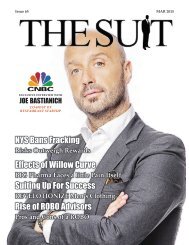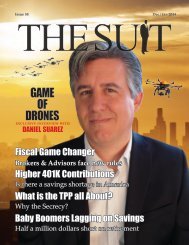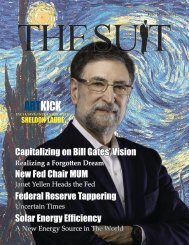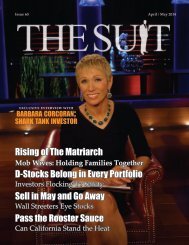o_19grqq7snim9mn019q11f7ds26a.pdf
Marcus Lemonis, a serial entrepreneur and host of the show “The Profit” on CNBC, is a true survivor in the corporate world. The native-born Lebanese business man endured the chaos of a civil war in Beirut and eventually moved to Miami. Lemonis was exposed to the automotive industry throughout his upbringing - his grandfather owning two of the largest Chevrolet dealerships in the United States and Lee Iacocca serving as the family friend and later mentor to Lemonis. On page 12, we conducted an interview with “Profit” host Marcus Lemonis, who offers struggling small businesses capital investment and his expertise in exchange for an ownership stake in the company. In the latter part of the magazine, we interviewed countless wealth advisors during these tough economic times. We recognize that some of the changes in 2013 and 2014 require relevance for financial planners. Therefore, the financial industry continues to push for more realistic standards and reforms.
Marcus Lemonis, a serial entrepreneur and host of the show “The Profit” on CNBC, is a true survivor in the corporate world. The native-born Lebanese business man endured the chaos of a civil war in Beirut and eventually moved to Miami. Lemonis was exposed to the automotive industry throughout his upbringing - his grandfather owning two of the largest Chevrolet dealerships in the United States and Lee Iacocca serving as the family friend and later mentor to Lemonis. On page 12, we conducted an interview with “Profit” host Marcus Lemonis, who offers struggling small businesses capital investment and his expertise in exchange for an ownership stake in the company. In the latter part of the magazine, we interviewed countless wealth advisors during these tough economic times. We recognize that some of the changes in 2013 and 2014 require relevance for financial planners. Therefore, the financial industry continues to push for more realistic standards and reforms.
Create successful ePaper yourself
Turn your PDF publications into a flip-book with our unique Google optimized e-Paper software.
they don’t want to think about it– and<br />
hope it all works out.”<br />
Baer well knows how that kind of<br />
plan is not a plan at all. He and Maffett<br />
encourage callers to seek professional<br />
assistance for piecing together<br />
a framework, crafted from<br />
their existing financial assets such as<br />
employer-sponsored retirement, social<br />
security benefits as well as other<br />
non-retirement assets. Realizing the<br />
weekly show isn’t enough to guide<br />
someone through financial planning,<br />
Baer feels it is at least a start – an outreach<br />
– that can better inform people<br />
of their needs and hopefully prompt<br />
them to contact an advisor.<br />
“Every person needs a picture of<br />
how their money – how their assets –<br />
should be distributed throughout their<br />
lifetime to ensure they have income<br />
that lasts,” Baer insisted.<br />
That need is more relevant today as<br />
the American lifespan increases. In the<br />
past, many Americans were fortunate<br />
if they enjoyed a mere ten years of retirement.<br />
“Today,” he said, “as many<br />
Americans live to be 90 or more years<br />
of age, a 25 to 30 year retirement is no<br />
longer uncommon.”<br />
Baer checks regularly to see if a client’s<br />
nest egg is big enough by running<br />
inflation calculators. These can illustrate<br />
what the purchasing power of<br />
today’s money will be tomorrow. He<br />
also talks to clients about the typical<br />
life cycle of retirement.<br />
“In their first years of retirement,<br />
most clients tend to spend perhaps<br />
even more money than they used to<br />
when working, because they travel<br />
a lot,” he notes. “Then in the middle<br />
years of retirement, they settle down.<br />
They aren’t spending as much then.<br />
But during the end years of retirement,<br />
much more tends to get spent because<br />
of health-related issues. So, we make<br />
sure we are building a spending plan<br />
around those needs, constantly monitoring<br />
and talking – and seeing how<br />
that plan is evolving.”<br />
As one example, Baer references<br />
an extremely healthy client currently<br />
living in Florida who has been retired<br />
since 1987. Careful planning has<br />
allowed the client to achieve this independence.<br />
Another client, now 15<br />
years into retirement, is in the same<br />
boat, but with more than enough money<br />
to last, according to Baer. “(This client)<br />
plays golf four days a week and<br />
tennis three times a week,” he said.The<br />
same was the case with a client with<br />
whom his father – and founder of Baer<br />
Wealth Management, William E. Baer<br />
– worked for 30 plus years. Kenny<br />
Baer says “I have worked with them<br />
now for the past ten years and they<br />
are living their retirement years quite<br />
comfortably.”<br />
Achieving this takes a disciplined<br />
approach to investing.<br />
“Oftentimes, clients can get caught<br />
up in all the statistics out there,” Baer<br />
said. “They ask questions such as,<br />
‘How did my portfolio do?’ or ‘How<br />
am I performing in the current market?’<br />
And what we do is to play the<br />
role of keeping them in a disciplined<br />
approach that will get them to their<br />
ultimate goal. We manage their money<br />
to that goal and not necessarily with<br />
the goal of beating the market.”<br />
Baer keeps the bulk of client assets –<br />
close to 99 percent of what the firm has<br />
under management – in mutual funds<br />
and exchange-traded funds. Only<br />
rarely, and after very careful scrutiny,<br />
does he recommend that a client invest<br />
in limited partnerships.<br />
“Every person needs a picture of how their<br />
money – how their assets – should be distributed<br />
throughout their lifetime to ensure they have<br />
income that lasts,” - Kenny Baer<br />
“We have to gain a full understanding<br />
of what the principals of any limited<br />
partnership we consider are doing,”<br />
Baer said. “We do full background<br />
checks. We expect them to hand over<br />
all of their personal information for<br />
verification. And we make sure that<br />
the principals have the same amount<br />
of investment in the limited partnership<br />
as they are recommending that<br />
our client take on.”<br />
“Looking at the success of our clients<br />
– those are the greatest successes<br />
of my career.”<br />
101 Village Parkway, Bldg 1, Suite 200<br />
Marietta, GA 30067<br />
www.baerwealth.com<br />
THE SUIT MAGAZINE p.49










